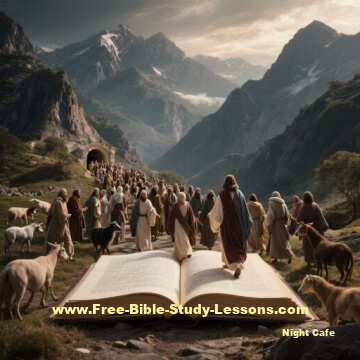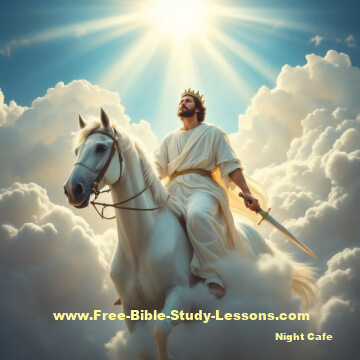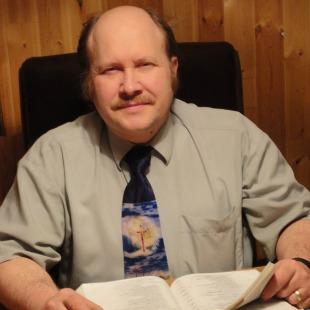| site search by freefind |
- Home
- Christian Life
- Few Chosen
[If you purchase anything on this site, I may make a commission. Disclosure Policy]
Are Only A Few Chosen
To Be Saved?
Quick Answer: A misunderstanding of a couple of Bible passages has led to the belief that there are only a few chosen to be saved from Hell. An examination of the Scripture as a whole reveals that God intends to save a multitude - probably the majority of people.
Where does the idea that there are only a few chosen to be saved come from? In Matthew 22:14, Jesus said, "For many are called, but few are chosen." [NKJV] Another famous quote on the subject is from Matthew 7:13-14: "Enter by the narrow gate; for wide is the gate and broad is the way that leads to destruction, and there are many who go in by it. Because narrow is the gate and difficult is the way which leads to life, and there are few who find it." [NKJV] By these teachings, was Jesus saying there are only a few chosen to be saved? Will the majority of people on the planet be condemned to hell? Will the love of God in the life, death, and resurrection of our Lord Jesus Christ really have so little impact on the lives of people?
Sitemap -
Newsletter -
Statement Of Faith -
Donate
Follow us on social media for daily Scripture comments and more at MeWe, Facebook or YouTube.

Some Christians, using the above verses, teach that only a few are chosen to be saved in these "last days," but what does the Bible really teach on the topic of "few chosen?"
The parables of Jesus certainly imply that a great number of people will be saved. The Parable of the Sower and the Soils ends with: "...but others fell on good ground, sprang up, and yielded a crop a hundredfold." [Luke 8:8, NKJV] If the good seed in the hearts of people reproduced itself a hundredfold, we would end up with a lot of Christians. Does this sound like a "few chosen?"
How about Luke 13:18-21? "Then He said, "What is the kingdom of God like? And to what should I compare it? It is like a mustard seed, which a man took and put in his garden; and it grew and became a large tree, and the birds of the air nested in its branches." And again He said, "To what shall I liken the kingdom of God? It is like leaven, which a woman took and hid in three measures of meal till all leavened." [NKJV] The point of both these parables is that the kingdom of God begins in a small, seemingly insignificant way, but it grows into something enormous. The kingdom of God is, of course, made up of people, so if the kingdom is large, then there must be a large number of people in it.
Again, Jesus makes this point in the Parable of the Marriage Feast. "Therefore go into the highways, and as many as you find, invite to the wedding. So the servants went out into the highways and gathered together all whom they found, both good and bad. And the wedding hall was filled with guests." [Matt. 22:9-10, NKJV] The wedding hall was filled: crowded, containing many people. The kingdom of God is going to be filled, not left half empty! How can there be only a few chosen in light of this?
Finally, let's quote two Old Testament passages. Daniel 2:35: "...and the stone that struck the image became a great mountain and filled the whole earth." [NKJV] In Nebuchadnezzar's dream, he saw a great image destroyed by a stone. The stone represented the kingdom of God. What happened? It grew to fill "the whole earth." And in Isaiah 11:9, it is prophesied that "the earth shall be full of the knowledge of the Lord as the waters cover the sea." [NKJV] Again, we see the great extent to which the kingdom of God will grow. It does not appear to be only a few chosen faithful ones!
Kingdom Of God:
Large Or Small?
If the kingdom of God is to be of such tremendous size, how can there be only a few chosen people to be saved? The answer is simple. It would be impossible for only a few to be chosen from the billions who have lived and are living, and still have these Scriptures fulfilled. Either the kingdom of God is small, or it is large. Either there are a few chosen or many chosen. It cannot be both.
Some people try to skirt the question by saying that, in the long term of history, only a few will be chosen to be saved. The world's population today is many times what it has been at any time in history, except perhaps just before the Flood. If there were to be a mass turning to God right now and in future years, it is quite possible that, including all history, a large number of people would know Jesus as Lord and Saviour. Even if they were right in their long-term historical view, the scriptures would still require a major turning to God before the end of time. If the kingdom of God is to grow to fill the earth, then it must, at least, end with a large number of people in the kingdom, which would mean there were many chosen rather than few chosen.
Of course, this would contradict the "end times" view of many, but we must search the Scriptures for what God says and not what man says. However, we are still faced with a problem. If the kingdom of God ends with a large number of people being swept into a relationship with God, what did Jesus mean by only a "few chosen" in the verses quoted at the beginning of this article?
Few Chosen
We'll need to examine each passage separately. Let's begin with Matt. 22:14: "For many are called, but few are chosen." [NKJV] As Feed Yourself students know, the context of any Scripture explains what it means and how it is to be applied. Much needless error has crept into the church and people's lives because one verse jumps out at them, and they forget to study context and its relation to Scripture as a whole.
To understand this verse, we need to ask some questions: Who was Jesus talking to? What was the point He was trying to make? Is He making a general statement or a specific statement aimed at a specific circumstance?
This verse comes at the end of the Marriage Feast Parable, where the guests who were invited to the wedding feast refused to come. The king had them killed and filled his wedding hall with other guests. Chapter 22 begins with: "And Jesus answered and spoke to them again by parables..." [Vs. 1, NKJV] This links us with chapter 21, so we have to go back there for our context. Who is Jesus talking to and why?
We have to go all the way back to Matthew 21:23 to find the setting for our passage. "Now when He came into the temple, the chief priests and the elders of the people confronted Him as He was teaching, and said, 'By what authority are You doing these things? And who gave You this authority?'" [NKJV] Now the picture begins to come into focus. Jesus was teaching the people. The chief priests and elders interrupted Him and demanded to know what authority He had to teach. Jesus responded by asking them a question, which they declined to answer, and so He refused to name His authority.
Jesus, however, followed up this encounter with three parables [Parable of the Two Sons, Parable of the Landowner, and Parable of the Marriage Feast] aimed directly at the chief priests and elders. Because of their hard-hearted refusal to believe in Him and their desire to keep others from believing, Jesus was very harsh with them.
In the Parable of the Two Sons, Jesus told the chief priests that they were only pretending to obey God - and that did not count. He ended by saying, "Assuredly, I say to you that tax collectors and harlots enter the kingdom of God before you. For John came to you in the way of righteousness, and you did not believe him; but tax collectors and harlots believed him; and when you saw it, you did not afterward relent and believe him." [Matt. 21:31-32, NKJV]
With the Parable of the Landowner, Jesus details their rebellion. The servants of the landowner came to the vinedressers and were badly treated or killed. Finally, the son himself came, and the vinedressers murdered him. Jesus ended that parable by saying, "Therefore I say to you, the kingdom of God will be taken from you and given to a nation bearing the fruits of it. And whoever falls on this stone will be broken; but on whomever it falls, it will grind him to powder." [Matt. 21:43-44, NKJV]
What was the reaction of the Jewish leaders? "Now when the chief priests and Pharisees heard His parables, they perceived that He was speaking of them. But when they sought to lay hands on Him, they feared the multitudes, because they took Him for a prophet." [Matt. 21:45-46, NKJV] They knew Jesus was talking about them, and they would have murdered Him right then if they thought they could get away with it.
And it is right then that Jesus gave the Parable of the Marriage Feast. Again, He shows that the leaders of the Jews deliberately rejected and made fun of the kingdom of God. The kingdom of God was taken away from them and given to others. How does Jesus end this parable? "For many are called, but few are chosen." Do you see the similarity between this and the previous two parables? The leaders of the Jews were called to enter the kingdom, but they rejected the call, and so there were only a few chosen, like Nicodemus.
When we examine the context, we find this verse is not a general statement about the kingdom of God as a whole. Rather, Jesus was specifically responding to a specific situation. He was underlining the point that the leaders of the Jews had rejected God, and so they were being rejected by God. This verse cannot legitimately be wrestled from its context to say that there are only a few chosen worldwide to be saved. Many Jewish leaders were called through the Scripture and the personal ministry of Jesus, but there were only a "few chosen."
The Narrow Gate
What about Matthew 7:13-14? "Enter by the narrow gate; for wide is the gate and broad is the way that leads to destruction, and there are many who go in by it. Because narrow is the gate and difficult is the way which leads to life, and there are few who find it." [NKJV] These verses come near the end of the Sermon on the Mount.
It sounds like what Paul had in mind in 1 Corinthians 1:21-24. "For since, in the wisdom of God, the world through wisdom did not know God, it pleased God through the foolishness of the message preached to save those who believe. For the Jews request a sign, and Greeks seek after wisdom, but we preach Christ crucified, to the Jews a stumbling block and to the Greeks foolishness, but to those who are called, both Jews and Greeks, Christ the power of God and the wisdom of God." [NKJV] The way of Christ is foolish to the religious and the non-religious, but to those who will accept it, it is the power of God - the gateway to an exciting new life - the understanding of reality.
Yes, but Jesus said, "There are few who find it." How do you explain that if you believe there are many chosen and not few chosen to be saved?
Again, we must keep context in mind. Jesus is speaking to a Jewish crowd - the ones who were going to find the truth a stumbling block. Many times in both the Old and New Testaments, it refers to the remnant of Israel who will be saved. Jesus is alluding to the remnant. He knew as a nation they would reject Him. So right from the beginning of His ministry, He was encouraging His listeners not to be drawn into that deception, not to become part of the crowd who would reject Him.
Also note, Jesus is stating a present condition [present when He was teaching]. He makes no prophecy that things will always be that way. The future could be different. In fact, as we have seen, many Scriptures teach that it will be different and it will not always be only a few chosen who find the way of life.
What about the question of Jesus in Luke 18:8? "...nevertheless, when the Son of Man comes, will He really find faith on the earth?" [NKJV] This is an interesting question, especially coming on the heels of a parable on persistence in prayer. If we don't persist and press through in prayer, then faith will be destroyed from the earth.
However, Jesus did not say that this was going to happen. He asked the question as a thought-provoker, and He never answered it. He wanted His listeners to realize the importance of prayer so they would press through, and faith on the earth would abound.
The pessimist always answers Jesus' question in the negative. "No, there won't be any faith left. Or if there is, it will only be a small amount, totally surrounded by its enemies. God help us all. I am one of the few chosen." And, whether our pessimist friend realizes it or not, he is working to bring his dire predictions to pass.
The optimist, who knows the above victory verses and many others, answers Jesus' question in the affirmative: "Yes, faith will be growing and conquering the world for the cause of our King." There is no reason the question of Jesus must be answered in the negative. We have just been trained to think negatively [much to the joy of the humanists].
Jesus will return for a victorious church. If the church is defeated when Jesus returns, then Satan is more powerful than the Holy Spirit. To teach the defeat of the church upon the earth is an insult to the glory of God, Who wants all nations to be drawn to its light.
"All the ends of the world shall remember and turn to the Lord, and all the families of the nations shall worship before You. For the kingdom is the Lord's, and He rules over the nations." [Ps. 22:27-28, NKJV]
"And the nations of those who are saved shall walk in its light, and the kings of the earth bring their glory and honour into it." [Rev. 21:24, NKJV]
The victory of the church must include, among other things, large numbers of people coming into the kingdom of God. There will come a time when Christians are a majority worldwide, and then the stage will be set for the physical return of our Beloved Lord Jesus Christ. In the worldwide view of things, there are many chosen, not few chosen.
For more information about Glenn Davis, see our About Glenn page or visit Glenn Davis Books.

Follow us on social media for daily Scripture comments and more at MeWe, Facebook or YouTube.
Sitemap -
Newsletter -
Statement Of Faith -
Donate
Sign up for our free monthly newsletter or take one of our free Bible Study courses.
Please note: We no longer have the commenting feature [maybe again in the future]. Joshua Institute students who have questions or comments on their courses can use the contact button and mention the course name and lesson number in the email. Thank you. Glenn

For more information about Glenn Davis, see our About Glenn page or visit Glenn Davis Books.
Privacy - Disclosure









